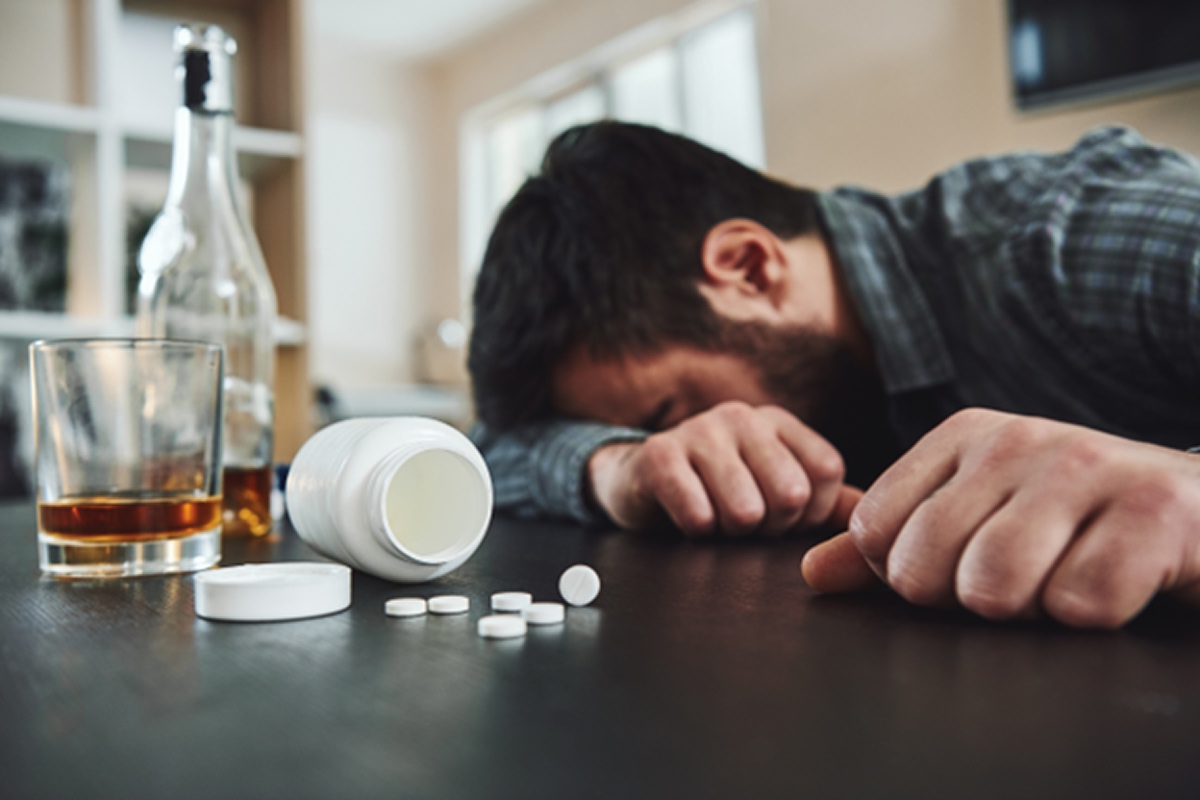Key Takeaways
- Mixing alcohol with the M365 pill can cause overdose, breathing problems, and addiction.
- Professional detox and therapy provide the safest path to recovery from mixing M365 pills with alcohol.
- 12 South Recovery helps clients heal physically, mentally, and emotionally through evidence-based care and ongoing support.
When Pain Relief Turns Risky
Mixing hydrocodone from the M365 pill with alcohol is far more dangerous than most people realize. Both substances slow vital functions like breathing and heart rate, and when combined, they can quickly overwhelm your body. Even one drink can intensify the effects of hydrocodone and lead to overdose or long-term health problems. What starts as pain relief or relaxation can become a serious and potentially life-threatening situation. At 12 South Recovery, we help people safely recover from alcohol and prescription pill misuse with professional care, compassion, and lasting support.

What Is the M365 Pill?
The M365 pill is a white, oval-shaped tablet that contains two active ingredients: hydrocodone and acetaminophen. Hydrocodone is an opioid painkiller, and acetaminophen is a non-opioid pain reliever often found in over-the-counter medications like Tylenol. Together, they provide effective pain relief for moderate to severe discomfort caused by surgery, injury, or chronic pain.
Because hydrocodone affects the brain’s opioid receptors, it can create a feeling of calm or mild euphoria. While this effect can help manage pain, it also increases the risk of opioid addiction when the medication is taken in higher doses or mixed with substances like alcohol.
What Is the M365 Pill Used For?
Doctors typically prescribe the M365 pill for short-term pain management when over-the-counter medications are not strong enough. It’s meant to be taken exactly as directed, usually for a few days to a couple of weeks.
However, the longer someone takes it, the more the body adapts to its effects. This tolerance can lead to misuse, as people may begin taking larger doses to achieve the same relief or relaxation. Combining it with alcohol often happens when someone wants to “enhance” those effects, but the combination puts immense pressure on the brain and body.
What Happens When You Mix Alcohol with the M365 Pill
Both alcohol and hydrocodone depress the central nervous system (CNS). This system controls vital functions like breathing, heart rate, and coordination. When the two are used together, their sedative effects multiply, slowing down the body’s ability to function properly.
You might feel drowsy or relaxed at first, but what’s really happening is dangerous:
- Breathing slows or stops.
- Heart rate drops dangerously low.
- The liver struggles to process both substances at once.
- Oxygen levels decrease, leading to loss of consciousness or brain injury.
In severe cases, mixing these two can cause respiratory failure, coma, or death, even if taken at prescribed doses.
Why Mixing Alcohol with the M365 Pill Is Dangerous
People often underestimate the risk of mixing alcohol and prescription medication because both are legal. But legality doesn’t equal safety. When hydrocodone interacts with alcohol, the liver can’t metabolize both efficiently, leading to toxic buildup in the body.
Here’s why it’s particularly dangerous:
- Breathing Suppression: Both substances slow the respiratory system, which can lead to suffocation during sleep.
- Liver Damage: The acetaminophen in the M365 pill and alcohol both strain the liver, increasing the risk of liver failure.
- Cognitive Impairment: The combination can lead to blackouts, confusion, or dangerous decision-making.
- Overdose Risk: Because both intensify sedation, it’s easy to lose consciousness or stop breathing entirely.
Even if it feels like “just one drink,” that single combination can push your body beyond its limits.
Short-Term Effects of Mixing Alcohol and the M365 Pill
Short-term use may cause effects that seem mild at first, but they can quickly escalate. These include:
- Dizziness and nausea
- Confusion or slurred speech
- Slow reaction time
- Blurred vision
- Drowsiness or sudden fatigue
- Difficulty breathing
The risk increases dramatically if you take higher doses or have an existing health condition affecting the heart, liver, or lungs.
Long-Term Risks of Combining Alcohol and Hydrocodone
Over time, mixing hydrocodone and alcohol can cause lasting harm to your body and mind. What might begin as occasional use can evolve into dependence or addiction, leading to serious consequences.
Physical effects:
- Permanent liver damage or failure
- Heart complications and blood pressure issues
- Damage to brain function, affecting memory and focus
- Increased tolerance and dependency on substances
Emotional and behavioral effects:
- Mood swings and irritability
- Anxiety and depression
- Neglect of responsibilities or relationships
- Withdrawal from daily life and activities
Without treatment, the combination can completely alter brain chemistry, making it difficult to function without either substance.
Recognizing the Signs of Dependence or Addiction
Many people who develop drug addiction or alcohol addiction didn’t intend to misuse their prescriptions. Addiction often begins subtly, with small behavioral or physical changes that grow over time.
Here are common signs to watch for:
- Craving pills or alcohol daily
- Hiding use or lying about it
- Taking more medication than prescribed
- Feeling irritable or sick when not using
- Struggling with focus, memory, or coordination
- Withdrawing from loved ones
If you or someone you care about shows these signs, it’s time to reach out for help. Addiction is a medical condition that can be treated with care and support.
What Happens When You Stop Mixing Alcohol with the M365 Pill
When you stop taking hydrocodone and alcohol, the body begins to detox, clearing the substances from your system. This process can cause withdrawal symptoms that range from mild discomfort to severe pain, depending on how long you’ve been using them.
Common withdrawal symptoms include:
- Muscle aches
- Chills and sweating
- Anxiety or depression
- Restlessness
- Nausea and vomiting
- Insomnia or fatigue
It’s important not to detox alone. Quitting suddenly can be dangerous, especially for long-term users, as both alcohol and opioids can trigger serious withdrawal reactions.
How Detox Works for Alcohol and Hydrocodone Dependence
At 12 South Recovery, detox is the first step toward healing. Our medical team provides 24/7 supervision to help clients safely manage withdrawal symptoms while keeping them comfortable and supported.
During detox:
- Medical professionals monitor vital signs and medication needs.
- Therapists provide emotional support and coping tools.
- The focus shifts from physical stabilization to preparing for long-term treatment.
Detox helps the body reset, clearing harmful substances so clients can begin addressing the psychological side of addiction through therapy and counseling.
Treatment Options for Alcohol and Prescription Pill Addiction
Once detox is complete, the next step is structured treatment to address the root causes of addiction. 12 South Recovery offers several levels of care to meet each client’s needs:
- Residential Treatment: A structured, supportive environment with 24-hour care.
- Partial Hospitalization Program (PHP): Daytime treatment with access to therapy, group sessions, and medical monitoring.
- Intensive Outpatient Program (IOP): Flexible therapy options that allow clients to maintain work or family responsibilities.
- Continuing Care & Alumni Program: Ongoing support after treatment to maintain long-term recovery.
Each program focuses on rebuilding stability, restoring confidence, and helping clients develop healthy coping strategies that last.
Therapies That Help Rebuild Mental and Emotional Health
12 South Recovery uses evidence-based therapies to help clients heal on every level: physically, mentally, and emotionally.
Some of the therapies include:
- Cognitive Behavioral Therapy (CBT): Helps identify and change negative thought patterns.
- Dialectical Behavior Therapy (DBT): Builds emotional regulation and interpersonal skills.
- Eye Movement Desensitization and Reprocessing (EMDR): Supports trauma recovery and emotional healing.
- Holistic and Adventure Therapy: Encourages mindfulness, self-awareness, and stress relief.
- Relapse Prevention Counseling: Provides tools for maintaining long-term sobriety.
These approaches help clients regain control of their thoughts and behaviors while fostering confidence and purpose in recovery.
Life After Detox: Building Strength and Purpose in Recovery
Recovery is about creating a life worth living. After detox and treatment, clients often rediscover passions, rebuild relationships, and find joy in daily life again.
At 12 South Recovery, continued care and community support help clients stay motivated. Our alumni program encourages connection and accountability, reminding everyone that recovery is ongoing but incredibly rewarding.
Living substance-free means waking up clear-headed, stable, and capable of achieving new goals. It’s proof that healing is possible, one day at a time.
Healing Starts at 12 South Recovery
Mixing hydrocodone from the M365 pill with alcohol is more dangerous than many people realize. Both substances slow vital body functions, and together, they can quickly lead to overdose, brain damage, or even death. What may begin as pain relief or an attempt to relax can spiral into dependence and addiction. The good news is that recovery is possible with the right help and support. At 12 South Recovery, we provide safe detox, therapy, and ongoing care to help you heal, rebuild, and move forward with strength and confidence. Call 12 South Recovery today to begin your path to lasting recovery and a healthier life.































